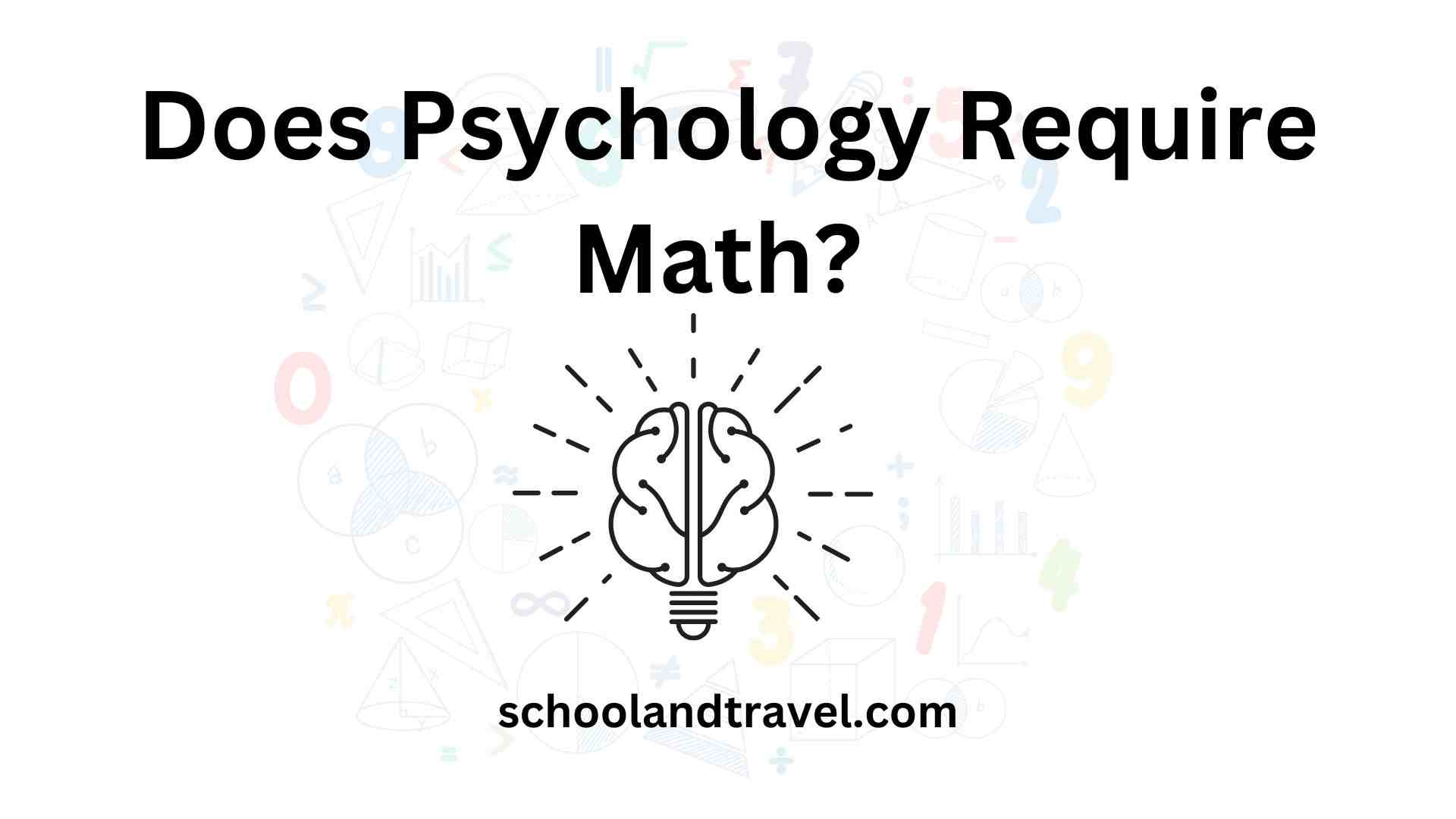Psychology is a fascinating field that explores the intricacies of the human mind and behavior.
While many are drawn to the study of psychology for its deep insights into the human experience, some may wonder about the role of math in this discipline.
Does psychology require math? This article will investigate this question and unravel the relationship between psychology and math.
We will explore the importance of math in psychological research and the math skills needed in psychology and debunk common misconceptions about the extent of math requirements in this field.
So, let’s embark on this journey to understand the role of math in psychology.
What is Psychology?
Psychology is the study of the mind and behavior from a scientific point of view. Psychologists work hard to study and understand how the mind works, how the brain works, and how people act.
What is the Role of Math in Psychology?
Mathematics plays a significant role in psychology, mainly research and data analysis.
It gives psychologists the tools to gather, analyze, and interpret data, enabling them to draw meaningful conclusions and make evidence-based decisions.
Here are some key areas where math is essential in psychology:
1. Statistical Analysis
Statistical methods are used to analyze data collected in psychological research studies.
This involves applying mathematical formulas to summarize and interpret data, identify patterns, test hypotheses, and conclude.
Statistical techniques such as correlations, regression analysis, and inferential statistics help psychologists make sense of complex data sets.
2. Research Design
Designing research studies requires a solid understanding of statistical concepts.
Psychologists must determine appropriate sample sizes, select the correct statistical tests, and make informed decisions about study variables and experimental conditions.
Math allows psychologists to design studies that are valid, reliable, and capable of producing meaningful results.
3. Psychometrics
Psychometrics is the field of study that focuses on the development and validation of psychological tests and assessments.
It involves applying mathematical principles to measure and assess various psychological constructs, such as intelligence, personality, and aptitude.
Psychometricians use mathematical models to evaluate the reliability and validity of assessment instruments, ensuring their accuracy and effectiveness.
4. Data Interpretation
Math skills are crucial for interpreting research findings and understanding the significance of statistical results.
Psychologists must be able to critically evaluate statistical measures such as p-values, confidence intervals, effect sizes, and significance levels to draw meaningful conclusions from their data.
This ability allows them to communicate research findings accurately and make informed decisions based on empirical evidence.
It is important to note that while math is an integral part of psychological research, not all areas of psychology require advanced mathematical skills.
Basic mathematical concepts such as arithmetic, algebra, and probability are typically sufficient for most undergraduate psychology programs.
Advanced mathematical techniques are more prevalent in specialized fields such as cognitive psychology, neuropsychology, and quantitative research methods.
Math Skills Required in Psychology:
While psychology is often associated with studying human behavior and the mind, it requires a certain level of math skills for various tasks.
Here are some critical math skills that are beneficial in the field of psychology:
1. Basic Arithmetic
Proficiency in basic arithmetic is essential for conducting simple calculations, such as adding, subtracting, multiplying, and dividing.
These skills are helpful when working with numerical data, calculating averages, and summarizing results.
2. Algebra
Understanding algebraic concepts is essential for analyzing and manipulating variables in psychological research.
It involves solving equations, working with formulas, and calculating unknowns.
Algebraic skills are precious when studying complex statistical models or conducting advanced data analysis.
3. Statistics
A solid foundation in statistics is crucial for psychologists. It involves understanding probability, hypothesis testing, correlation, regression, and inferential statistics.
Statistical proficiency allows psychologists to analyze data, draw conclusions, and make evidence-based decisions.
4. Data Analysis
Psychologists often work with large data sets; strong data analysis skills are essential.
This includes organizing and managing data, using statistical software packages, performing calculations, and interpreting results accurately.
5. Research Design
Math skills are also essential when designing research studies.
Psychologists need to determine appropriate sample sizes, calculate statistical power, and understand the principles of randomization.
They must be able to apply mathematical principles to design studies that yield reliable and valid results.
6. Critical Thinking
While not a specific math skill, critical thinking is closely linked to mathematical reasoning.
Psychologists must be able to analyze and evaluate numerical data, identify patterns, and draw logical conclusions.
Critical thinking skills are essential when interpreting research findings and making informed judgments.
Real-Life Applications of Math in Psychology:
Mathematics plays a crucial role in various aspects of psychological research and practice. Here are some real-life applications of math in psychology:
1. Psychological Testing
Psychologists often use psychometric tests to assess individuals’ cognitive abilities, personality traits, and mental health.
These tests rely on mathematical principles such as test construction, item analysis, and scoring.
Psychologists use statistical techniques to analyze test results and interpret scores accurately.
2. Experimental Design
In experimental research, psychologists use mathematical principles to design studies that control for confounding variables, randomize conditions, and determine sample sizes.
This ensures the validity and reliability of the findings.
3. Data Analysis
Math is essential for analyzing and interpreting research data.
Psychologists use statistical methods to analyze quantitative data, such as surveys, experiments, and observational studies.
They employ statistical tests, regression analyses, and factor analyses to explore relationships, detect patterns, and draw meaningful conclusions from the data.
4. Neuroscience and Brain Imaging
The field of neuropsychology relies heavily on mathematical modeling and analysis.
Techniques such as functional magnetic resonance imaging (fMRI) and electroencephalography (EEG) generate complex data sets that require mathematical algorithms for signal processing, data visualization, and statistical analysis.
5. Psychological Research
Math is integral to research design and statistical analysis in psychology. Psychologists use mathematical models and theories to develop hypotheses and design experiments.
They apply statistical techniques to analyze data and test hypotheses, making inferences about populations based on sample data.
6. Computational Modeling
Computational models are used in psychology to simulate complex psychological processes and behaviors.
These models employ mathematical algorithms and programming languages to simulate cognitive processes, learning, decision-making, and social interactions.
7. Behavioral Economics
Behavioral economics combines principles from psychology and economics to study human decision-making.
Math models and analyzes economic behavior, develops decision-making theories, and tests economic hypotheses in real-world scenarios.
Frequently Asked Questions: Does Psychology Require Maths?
Mathematics is an essential component of psychology education. While only some psychology programs require advanced math courses, a basic understanding of statistical concepts and research methods is necessary for conducting empirical research and analyzing data.
Mathematics is used in psychological research to design studies, collect and analyze data, and draw conclusions. Psychologists use statistical techniques to analyze data and determine the significance of findings. Math is also applied in psychometrics, cognitive modeling, and brain imaging studies.
While math is a part of psychology, it doesn’t mean you need to be a math genius to pursue a career in this field. Many psychology programs offer introductory math and statistics courses to help students develop the necessary skills. Resources and support, such as tutoring or online courses, are also available to help students improve their math abilities.
Essential math skills for psychologists include basic arithmetic, algebra, statistical analysis, and understanding research methods. Proficiency in statistical software and data analysis techniques is also beneficial for conducting research and interpreting findings.
While therapists and counselors may not use advanced math skills in their day-to-day practice, a foundational understanding of statistical concepts and research methods is still essential. It enables them to evaluate research studies critically, understand the evidence base for different therapeutic approaches, and interpret outcome measures. Strong math skills can also be an advantage when working in research or academic settings within psychology.
Conclusion
Basic math skills are essential, as they provide a foundation for understanding statistical analysis and research methods.
Advanced math concepts may be encountered in specific subfields of psychology or advanced research endeavors, but they are not a prerequisite for pursuing a career in psychology.
It is essential to recognize the interdisciplinary nature of psychology and the diverse range of skills it encompasses.
So, whether you have a passion for numbers or prefer other aspects of psychology, there is a place for you in this fascinating field.
Editor’s Recommendations:
- Is Chemistry Harder to Study than Physics? (FAQs)
- Is Biochemistry a Good Major for Medical School? (FAQs)
- Is Mechanical Engineering Hard? (FAQs)
- Do You Need A College Degree To Be A Cop? (FAQs)
- How Many Volunteer Hours Do You Need For College? (FAQs)
- 10 Easiest Science Classes In College (Tips, FAQs)
If you find this article good, please share it with a friend.





